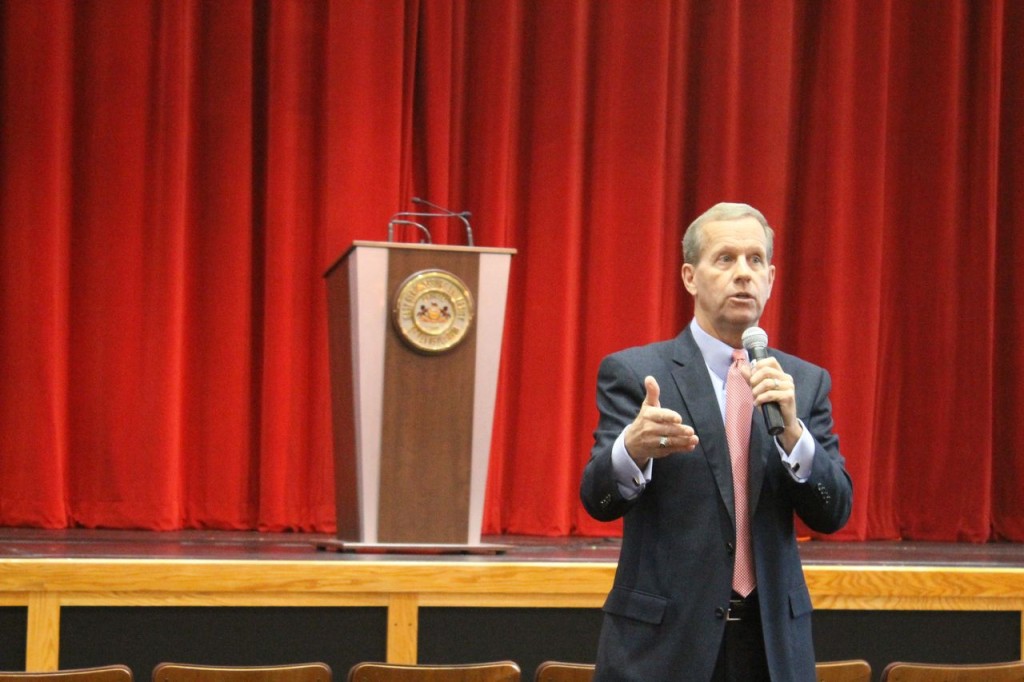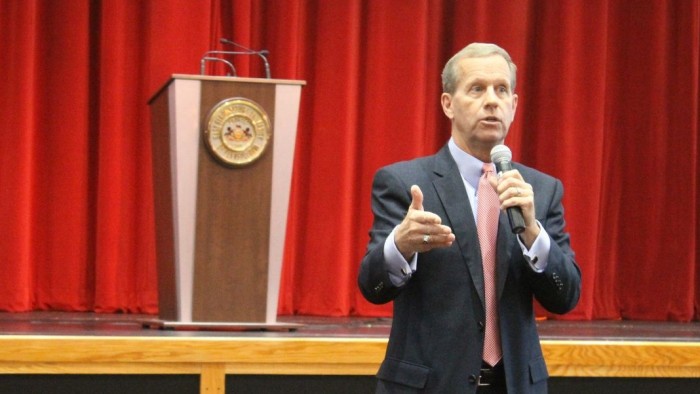

Photo Credit / Victoria Krukenkamp
BY VICTORIA KRUKENKAMP
Managing Editor
Last, but not least, ESU received the new Pennsylvania State System of Higher Education (PASSHE) Chancellor, Frank T. Brogan, on Tuesday, December 3, 2013, as a part of his initiative to visit all fourteen PASSHE schools.
In this, his last PASSHE campus visit, Brogan hosted an open forum at the Abeloff Center for the Performing Arts, where he spoke to the campus community, and then answered questions.
“I’ve looked at the system hard, and now have been to all the universities in it, and one of the things that I have found in looking at all the great universities—and not just as they exist today, because they have existed in a remarkable fashion for a long time,” said Brogan.
“There is not, in the Florida Universities, the long, historic, tradition that you find in most of our fourteen universities.”
Brogan outlined his view of the three unique successes of the PASSHE system—geography, cost, and academic programs.
“What the fourteen represent, there really are three things,” said Brogan. “One, incredible geography—it is no accident that there are fourteen universities virtually in every location around the commonwealth of Pennsylvania.”
“The second thing, besides geography, would be the cost,” continued Brogan. “The idea of keeping the cost as affordable as possible because of the fact that these are public universities, and then, therefore, the students needed it.”
“And third, of course, was academic programs array,” concluded Brogan. “It was critical, years ago, that each university largely be established in a very similar program array. This made sure that people were not kept out of their degree options because they could not venture to other places.”
After outlining the state of the PASSHE system, Brogan looked to its future.
“Where do we go from here as a system?” asked Brogan.
Brogan’s vision for the future of the PASSHE system evokes the Preamble of the United States Constitution in that he hopes “to form a more perfect union” of the fourteen PASSHE schools.
Brogan hopes that across the system all academic programs are offered to the right publics, and that a constant review of the programs is in place.
“There should be a system of checks and balances to make certain that majors exist where they need to be,” said Brogan.
Next, Brogan tackled the ever present question of the slashed PASSHE funding.
Since enrollment has been decreasing at all educational institutions, Brogan explained that this negatively affects funding to higher education across the country. Yet, Brogan wants to do all that he can to fix the funding issues that the PASSHE schools face.
Chancellor Brogan advised that in order to achieve success in obtaining funding from any governing body, there is strength in numbers.
Brogan recognized the state funding issues that all PASSHE schools are facing, and encouraged a joint effort when seeking an increase for funding.
“What you have to understand is that after you comes corrections, and the department of children and families,” said Brogan.
Brogan explained, however, that state universities are not “takers,” but rather “givers,” since students that graduate from the PASSHE schools only better the Commonwealth of Pennsylvania when they enter the state’s workforce.
Ending the question and answer session, ESU student Emily Fox received applause from the audience when she expressed her concern about the recent cuts at ESU, and sought an answer from the chancellor regarding the deep cuts in her chemistry program.
“For my minor, I need one more class,” said Fox, “and that professor was just restructured. We just need promises that we know are honest, and not empty, and I’m just wondering if you have anything to say.”
“I can tell you this,” responded Brogan. “I have spoken to each of the presidents who have been—at least this year—engaged in retrenchment, and I’ve gotten assurance from them that after all of this—as difficult as this has been—one of the, if not the, most important outcomes has got to be the teach out of any student impacted by the decisions that have been made.”
Brogan assured Fox and other concerned students that they will be able to complete their degree.
“I would assure you that every consideration is going to be made to every student who has been caught in the middle of this,” said Brogan.
Brogan expressed a desire that he could change the effects retrenchment has had on students, but that he didn’t have the ability to do so.
“I wish I could tell you that you will be uninterrupted, and you won’t feel a thing,” said Brogan. “I can’t do that. But at the end of the day, getting you to the graduation stage, and getting you to a degree is our primary focus.”
Email Victoria at:
vkrukenkam@live.esu.edu

